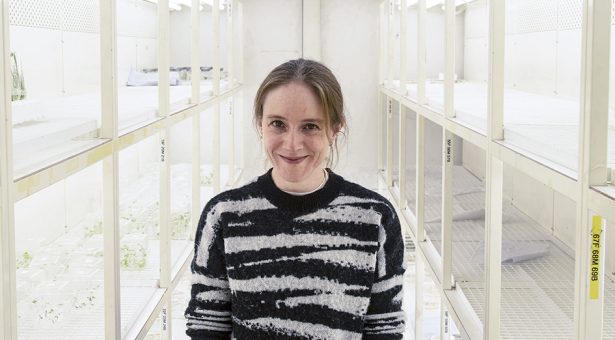
Curiosity-driven research probing the mysteries of cell-to-cell communication has been awarded prestigious European Research Council (ERC) funding.
Professor Christine Faulkner and her group at the John Innes Centre have received the ERC Advanced Grant which supports excellent research scientists who are established in their field.
"This funding will take our discovery research into cell-to-cell communication in new directions. I am extremely excited about the possibilities and opportunities this will open," said Professor Faulkner.
Their new project, ACUTE (Apoplastic signalling communicates emergency responses) is inspired by previous Faulkner group investigations into the route that amino acids travel through plant tissues, and how they trigger responses in the cells that they pass.
ACUTE will explore how a variety of different molecules travel between cells, acting as information carriers in response to different stresses. The project will address how these signalling molecules are released, how far they travel, and what information they carry.
"We have proposed that the transmission of these signalling molecules is dependent on physical and measurable parameters," said Professor Faulkner. "ACUTE aims to determine these parameters and use them to predict which cells and tissues will respond to different stress signals under different conditions. This way we can predict the overall impact of different stresses across the whole plant."
Iliana Ivanova, European Commissioner for Innovation, Research, Culture, Education and Youth, said: "This investment nurtures the next generation of brilliant minds. I look forward to seeing the resulting breakthroughs and fresh advancements in the years ahead."
President of the European Research Council Professor Maria Leptin said: "Congratulations to the 255 researchers who will receive grants to follow their scientific instinct in this new funding round. I am particularly happy to see more mid-career scientists amongst the Advanced Grant winners this time. I hope that it will encourage more researchers at this career stage to apply for these grants."
The funding is amongst the EU's most prestigious and competitive, providing leading senior researchers with the opportunity to pursue ambitious, curiosity-driven projects that could lead to major scientific breakthroughs. The new grants, worth in total nearly €652 million, are part of the EU's Horizon Europe programme.
The successful candidates will host their projects at universities and research centres in 19 EU Member States and associated countries, notably in Germany (50 grants), France (37) and the Netherlands (23). Among the winners there are Germans (50 researchers), French (31), Britons (28), Italians (22) and citizens of 28 other nations.
This competition attracted 1,829 proposals, which were reviewed by panels of internationally renowned researchers. Nearly fourteen percent of proposals were selected for funding. Estimates show that the grants will create 2,480 jobs in teams of new grantees.
The ERC Advanced Grants target established, leading researchers with a proven track record of significant achievements. In recent years, there has been a steady rise in midcareer researchers (12-17 years post-PhD), who have been successful in the Advanced Grants competitions, with 18% securing grants in this latest round.
About the ERC
The ERC, set up by the European Union in 2007, is the premier European funding organisation for excellent frontier research. It funds creative researchers of any nationality and age, to run projects based across Europe. The ERC offers four core grant schemes: Starting Grants, Consolidator Grants, Advanced Grants and Synergy Grants. With its additional Proof of Concept Grant scheme, the ERC helps grantees to bridge the gap between their pioneering research and early phases of its commercialisation.
The ERC is led by an independent governing body, the Scientific Council. Since November 2021, Maria Leptin is the President of the ERC. The overall ERC budget from 2021 to 2027 is more than €16 billion, as part of the Horizon Europe programme, under the responsibility of European Commissioner for Innovation, Research, Culture, Education and Youth, Iliana Ivanova.






